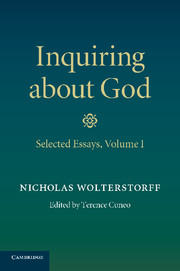Book contents
- Frontmatter
- Contents
- Editor's introduction
- Acknowledgments
- Introduction
- 1 Analytic philosophy of religion: retrospect and prospect
- 2 Is it possible and desirable for theologians to recover from Kant?
- 3 Conundrums in Kant's rational religion
- 4 In defense of Gaunilo's defense of the fool
- 5 Divine simplicity
- 6 Alston on Aquinas on theological predication
- 7 God everlasting
- 8 Unqualified divine temporality
- 9 Suffering love
- 10 Is God disturbed by what transpires in human affairs?
- 11 The silence of the God who speaks
- 12 Barth on evil
- 13 Tertullian's enduring question
- Bibliography
- Index
4 - In defense of Gaunilo's defense of the fool
Published online by Cambridge University Press: 04 May 2010
- Frontmatter
- Contents
- Editor's introduction
- Acknowledgments
- Introduction
- 1 Analytic philosophy of religion: retrospect and prospect
- 2 Is it possible and desirable for theologians to recover from Kant?
- 3 Conundrums in Kant's rational religion
- 4 In defense of Gaunilo's defense of the fool
- 5 Divine simplicity
- 6 Alston on Aquinas on theological predication
- 7 God everlasting
- 8 Unqualified divine temporality
- 9 Suffering love
- 10 Is God disturbed by what transpires in human affairs?
- 11 The silence of the God who speaks
- 12 Barth on evil
- 13 Tertullian's enduring question
- Bibliography
- Index
Summary
I propose saying a good word on behalf of Gaunilo. He has not fared well at the hands of history. While not himself a first-rate thinker – that is clear from the brief text of his that has been preserved – he undertook to debate with one of the genius theologian-philosophers of the Western tradition, namely, Anselm. Yet sometimes second- and third-rate thinkers make good points against first-rate thinkers. I shall argue that Gaunilo made some telling points against Anselm – though not, I readily agree, in a first-rate way. Anselm realized the “tellingness” of these points, so I shall also argue. The sign of his realization, however, is not concession; Anselm does not concede. The sign is rather bluster. Not even the saints are sinless! Anselm's glittering genius has made many reluctant to concede that Gaunilo made any telling points against him; his saintly reputation makes us all reluctant to concede that he concealed when he should have conceded.
Suspicion first arises when, in the course of reading the whole of Gaunilo's defense of the fool and the whole of Anselm's reply, we look to see why Anselm thinks Gaunilo's argument for the existence in reality of an island, such that none more excellent can be conceived, is not a good analogue to his own argument for the existence of that than which nothing greater can be conceived. It's absurd to suppose that one could in this way establish the existence of such an island.
- Type
- Chapter
- Information
- Inquiring about God , pp. 68 - 90Publisher: Cambridge University PressPrint publication year: 2010
- 1
- Cited by



